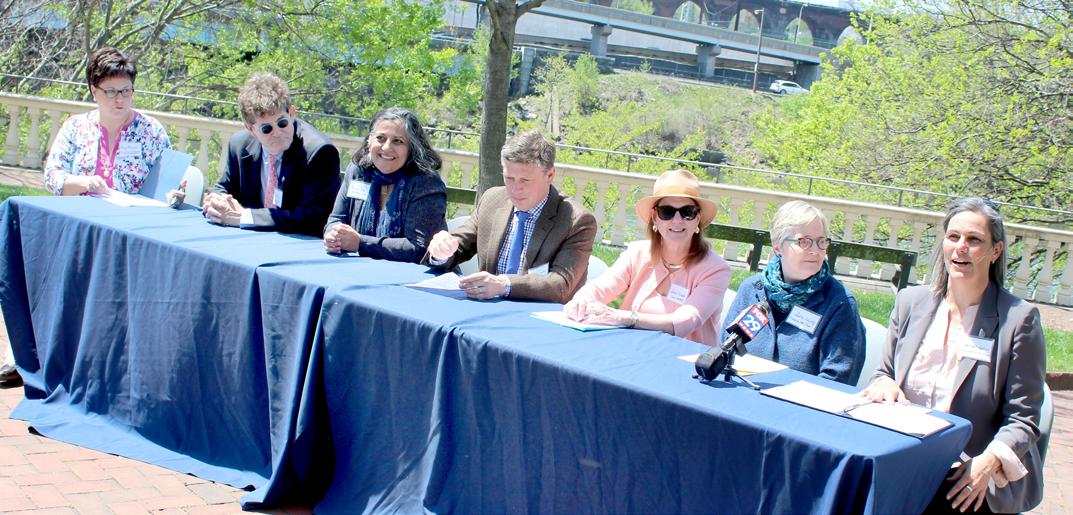
4 minute read
Estuary News 2018, Issue 2
Representatives from partner agencies get ready to sign a memorandum of understanding for the Aquatic Research and Restoration Center. From left to right are Kathryn Ott Lovell, commissioner for the Philadelphia Department of Parks and Recreation; John Brady, president and CEO of the Independence Seaport Museum; Maitreyi Roy, executive director of the John Bartram’s Association; Scott Cooper, president and CEO of the Academy of Natural Sciences of Drexel University; Donna Murasko, dean of the College of Arts and Sciences at Drexel University; Debra McCarty, commissioner for the Philadelphia Water Department and Jennifer Adkins, executive director of the Partnership for the Delaware Estuary (PDE).
In May, the Partnership for the Delaware Estuary (PDE) became one of seven regional cultural and environmental organizations to lay the groundwork for a better environmental future. At a ceremony outside Fairmount Water Works Interpretive Education Center, PDE and partners signed a memorandum of understanding to officially form the Aquatic Research and Restoration Center (ARRC). Besides PDE, ARRC partners include:
Philadelphia Water Department
Philadelphia Department of Parks and Recreation
Drexel University’s College of Arts and Sciences
The Academy of Natural Sciences of Drexel University
Independence Seaport Museum
Bartram’s Garden
“The goal of this endeavor is to advance innovative science and restoration for improving the health of urban waterways,” PDE Executive Director Jennifer Adkins said.
ARRC is committed to the developing programs and projects that promote cleaner water and environmental resilience in the urban waters of the Delaware Estuary. Projects would include a large-scale freshwater mussel hatchery and educational center in Philadelphia, shad propagation and living shorelines projects. The Pennsylvania Infrastructure Investment Authority plans to invest $7.9 million in freshwater mussel propagation and restoration, including construction of a hatchery. The facility would be the first in the world to be dedicated to restoring freshwater mussels for the main goal of promoting cleaner water. Mussels are natural water filters. An adult mussel can filter up to 10 gallons of water a day. Hatchery-bred mussels will be raised in ponds across the region, then be transplanted to streams.
“Freshwater mussels are one of the most imperiled groups of animals and restoring healthy mussel beds in appropriate areas is one way that we can rebuild nature’s ability to filter some important types of pollutants,” PDE Science Director Danielle Kreeger said. “The ARRC team will also explore new ways to restore mussel beds, such as in living shoreline projects. These are new restoration concepts, and the ARRC will foster collaboration to test where and how mussel beds, wetlands and living shorelines furnish the greatest environmental and societal benefits.”
Bartram’s Gardens in Philadelphia is the chosen site for the proposed large-scale mussel hatchery.
Maitreyi Roy, executive director of John Bartram’s Association, called the partnership a wonderful opportunity for Bartram’s to expand its watershed education. She said that hundreds of children who come to the garden could engage in what it takes to care for our watershed.
The original concept for the partnership developed several years ago with a few agencies. The MOU expanded the partnership to the eight agencies.
Since a small-scale mussel hatchery opened last year at Fairmount Water Works, scientists from PDE, Philadelphia Water Department and Drexel University have successfully bred mussels of five different native species. Together with other PDE-led mussel projects, more than 30,000 baby mussels have been produced since early 2017.
“That’s one healthy household of mussels,” said Debra McCarty, commissioner for the Philadelphia Water Department. “And one of the coolest hidden gems of the city.”
John Brady, president and CEO of the Independence Seaport Museum in Philadelphia said the work ahead would not be possible without the help of all the institutions coming together to form the partnership.
Kathryn Ott Lovell, commissioner with the Philadelphia Department of Parks & Recreation said it was appropriate to hold the signing at the Fairmount Water Works.
“Not only is the history of Philadelphia directly connected to our waterways, but the history of our department is directly connected to [Fairmount Water Works] in an effort to keep the city’s water supply clean.”
“The fact that it has become a reality with already some success is amazing,” said Donna Murasko, dean of the college of Arts and Sciences at Drexel University.
Scott Cooper, president and CEO of the Academy of Natural Sciences of Drexel University said ARRC’s formation is an important step in developing a wide range of education and research opportunities throughout Pennsylvania, New Jersey and Delaware.
“It’s exciting that we might be able to bring back mussels into areas that have not had them for decades,” Cooper said. “And in this way, we’ll be helping in some small part stabilize stream bottoms and to increase stream water quality.”




